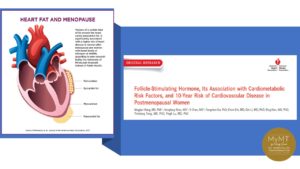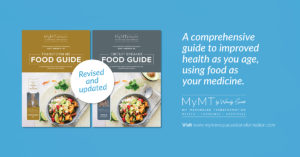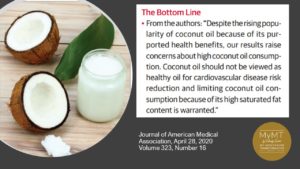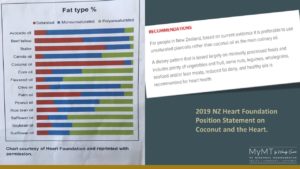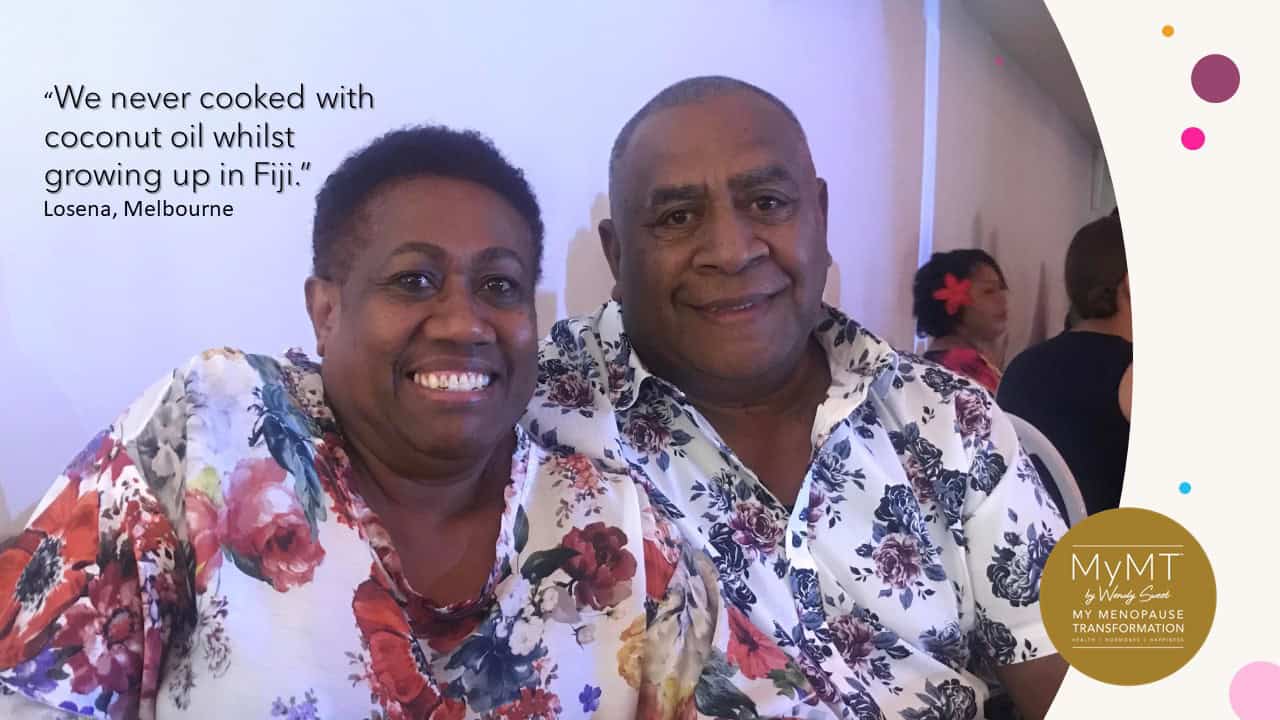“Growing up in Fiji, we never cooked with coconut oil” mentioned Losena in an email to me. After reading new evidence noting how we need to be cautious about all the marketing hype with coconut oil, I wanted to hear from her. Afterall, the marketing is based on the experience of Pacific Islanders using coconut oils for improved health. “The only thing we used for cooking was the coconut meat and the oil was used in our hair. My mother taught us not to cook with it as it affects heart health.”
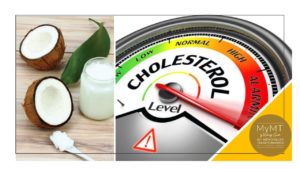
Over 25 years ago I went on a trip to Fiji to present at a conference. It was the year that a pharmaceutical company was launching their brand new weight loss ‘magic-pill’. My invitation was to talk to Doctors about the role of exercise in cholesterol management. One of those Doctors was Professor Harvey White, a prominent cardiologist, who still practices in New Zealand to this day.
I sat in on all the sessions and heard Professor White tell an interesting story about the rise of heart disease in the Pacific Island communities. He had been studying heart disease in Pacific communities for over 20 years and had seen the introduction of western ways of eating and the increase in cholesterol levels as Pacific Islanders became more sedentary and changed the way they ate. They didn’t eat Coconut Oil in their traditional diets.
Low levels of heart disease in traditional Pacific communities are often used as proof of the benefits of coconut oil. However, the original studies by Professor White and his team, found that coconut was pressed and eaten as coconut flesh and coconut milk was added to meals. Both the flesh and the milk are lower in saturated fat. Coconut oil wasn’t used for cooking. It was more commonly used on the skin and hair rather than used as a food.
As I put together the Food information for women on my 12 week MyMT™ programmes, I read the research on the role of coconut oils in the human body. Like most things that appear on our supermarket shelves, these are promoted as a panacea to all sorts of health concerns and given a ‘one-size-fits-all’ label. But for women going into menopause and beyond, it’s prudent to be cautious about coconut oils – especially if your Low Density Lipoprotein (LDL) cholesterol is high. This is the one that we need to be aware of with our changing hormonal environment in menopause. This is the type of cholesterol that may affect cardiac health.
For women who are losing the role of oestrogen in their blood vessels which helps to maintain blood vessel dilation, this is important. As we age and lose oestrogen, our blood vessels become ‘stiffer’ causing blood pressure to increase too. The combination of high blood pressure and high circulating cholesterol can cause all sorts of health chaos as women go into post-menopause, with many women ending up on all sorts of medications in menopause.
As those of you who follow me on here and read my articles know, I try as much as possible to keep this programme in anti-inflammatory and heart-friendly ageing research. This is partly because the greatest health concern for all of us as we transition menopause is that of our cardiac health. Heart disease is the number 1 concern for women in post-menopause in numerous countries around the world, especially if they aren’t sleeping and/or putting on abdominal fat.
In a recently released article by Palgrave Communications, an exposure of 100 of the ‘best-selling’ diet books was reported. “Many people turn to books for nutritional advice, making the contents of these books and the expertise of their authors relevant to public health” stated the article. The books were identified and assessed for both the claims they make in their summaries and the credentials of the authors. Weight loss was a common theme.
Yet in addition to weight loss, 31 of the books promised to cure or prevent a host of diseases, including diabetes, heart disease, cancer, and dementia; however, the nutritional advice given to achieve these outcomes varied widely in terms of which types of foods should be consumed or avoided and this information was often contradictory between books. Only 3 of the authors of these books were qualified nutritionists.
I was reminded of the importance of science and not marketing recently when the Journal of the American Medical Association, [JAMA] reported on a brand new study about Coconut Oils. It was a comparison of coconut oil with other fats and the effect on cholesterol levels.
The heading didn’t pull any punches – ‘Coconut Oil’s Health Halo a Mirage’ states the headline and it reports exactly what my own navigation of the women’s heart health research reports – that coconut oil significantly increases low density lipoprotein (LDL) cholesterol.
All the women in the MyMT™ community on my
12 week programmes have heard me talk about my preference to olive oil over coconut oil. This is because olive oil is well validated in women’s healthy ageing studies and if you have sore joints then you might also like to read an earlier article
HERE.
Whilst I do have some recipes that contain coconut oil and coconut milk in the MyMT™ Food Guide, which is part of my 12 week programmes, I don’t have many. There’s a reason for this.
Coconut oils are not well evidenced for women’s heart health as we age. Despite the fact that it is a plant source of fat, it acts the same as a saturated fat in the body. For women who also have a fatty liver, take note!
For those of you doing lots of endurance exercise, you can get away with the increased saturated fats in your diet, but for those of you with a fatty liver or family history of heart disease or you are overweight, then please be cautious about your intake of Coconut Oil – despite the marketing hype around it!
Here are some highlights from the research:
Compared with Palm Oil, coconut oil significantly increased LDL-C (the ‘bad’ cholesterol) by 10mg/dL and total cholesterol levels by 14mg/dL.
Coconut oil did not significantly affect triglycerides (circulating fats in blood) nor inflammatory markers.
Coconut oil should not be viewed as a healthy oil for cardiovascular disease risk reduction and limiting coconut oil consumption because of its high saturated fat content is warranted.
When I was trying to untangle my own rapid increase in cholesterol in my early 50’s I remembered Professor White’s talk. So, I turned to the research about heart health. Like many of you, I was so confused about the role of coconut oils, fats and yoghurts that have become more prominent in the supermarket.
On a Paleo and Keto diet the intake of these products is heavily promoted. And yes, I’ve put them all in my supermarket trolley in the past as well. But on exploring the research and positioning our health as we age, I stopped doing that and went back to Olive Oil and at the time, Canola Oil as well.
These two oils have the lowest amounts of saturated fats. I figured that if I already had high cholesterol, then 50 years of research from the Framingham Heart Study, shows that high levels of saturated fats contribute to high cholesterol levels in the body. That’s why have to be careful about our TOTAL INTAKE of saturated fats which clog up the liver blood vessels and reduce the uptake of lovely nutrients that our body needs at this time of our lives.
When it comes to heart health and high cholesterol, the type of fats you eat matters. Especially, if you aren’t (or can’t) do a lot of endurance exercise. Because I was so confused myself at what oils to use during menopause, I turned to the organisation that does the most research on heart health in New Zealand – the NZ Heart Foundation. They have now updated their stance on coconut oils and fats in a scientific review.
[Downloadable on their website]. Their Position Statement confirms what I have been reading as well,
“A recent scientific review by the Heart Foundation does not support the use of coconut oil in place of other plant oils that are lower in saturated fat. The review found that the health benefits of coconut oil claimed in marketing are not supported by sound scientific evidence for cardiac health.
The main fatty acid in coconut oil is lauric acid. Lauric acid behaves in the body like a long-chain saturated fatty acid so they are larger than fats present in other plant oils. Whilst coconut does not raise total cholesterol to the same extent as butter, the increase is greater than other plant oils. In general whilst 30mls of coconut oil does not promote weight gain or inflammation, findings in Sri Lanka, where there was a high intake of coconut oil, show high rates of heart disease.
Heart disease rates have been low in Pacific countries, because coconut is consumed as flesh and as milk. Coconut oil was not traditionally used in food preparation. The consumption of coconut has been in the context of a traditional Pacific diet with plenty of vegetables (including starchy vegetables), fruit, seafood and a physically active lifestyle.” [NZHF. Position Statement, 2014].
How interesting that over 25 years ago, I heard the exact same commentary from Professor Harvey White too.
Three large studies spanning 30 years convinces me that in being ‘kind’ to our heart, we need to be cautious about the marketing of foods., especially oils. There are so many on the market these days and like many things, it becomes very confusing.
In light of this research, we also need to be careful of smoothies (especially commercially bought ones) that have as their base, coconut oil and coconut milk. It might taste great, but it’s dumping lots of saturated fats and harmful cholesterol into your gut and liver and eventually, your blood vessels too.
If you already know that you have a fatty liver, then reduce your total daily consumption of saturated fats and replace coconut oil with olive oil instead. If you are thinner and doing lots of exercise, then yes, you can afford to have a bit more saturated fat in your diet for your energy levels. You choose.
PS: When you have time, some information about the 12 week MyMT™ Transform Me weight loss programme information is in the short video below. If your cholesterol has increased during menopause, then you will love this programme which is based on heart-health evidence too.

